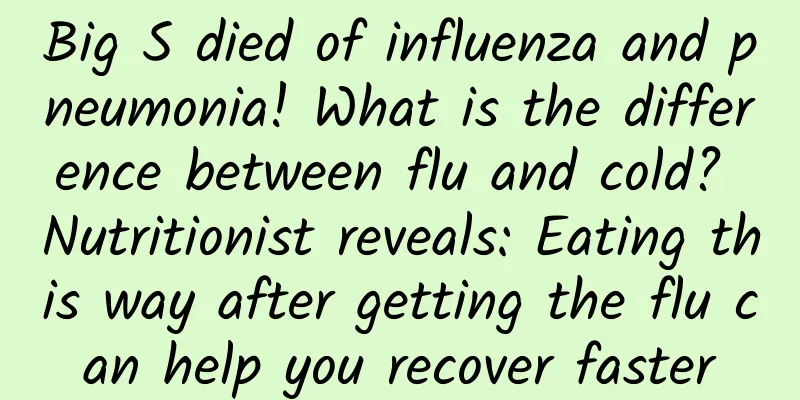Big S died of influenza and pneumonia! What is the difference between flu and cold? Nutritionist reveals: Eating this way after getting the flu can help you recover faster

|
Big S Xu Xiyuan unfortunately passed away in Japan due to influenza and pneumonia! According to media reports, the number of influenza patients in Japan has surged, reaching a peak at the end of December last year. So far, more than 9.5 million people have been infected. The unfortunate news of Big S's death has made people aware of the importance of preventing influenza. Nutritionist Gao Minmin also provides dietary precautions after being infected with the flu, which can help speed up recovery after contracting the flu. In addition to getting the flu vaccine as soon as possible, you should also pay attention to a proper diet to provide protection. The following are some dietary considerations provided by nutritionist Gao Minmin after contracting the flu, which will help speed up recovery: Eat this to speed up recovery after getting the flu1. Drink plenty of water The human body needs about 2,500cc to 3,000cc of water a day. Drinking enough water can promote the metabolism of harmful substances in the body. 2. Replenish electrolytes You can supplement more electrolytes, maintain the electrolyte balance in the body, and alleviate the side effects of nausea, vomiting, and diarrhea. 3. Eat soft foods such as pumpkin, sweet potato, and mashed potato People with sore throats often skip meals because it hurts, which can easily lead to nutritional deficiencies. You can eat soft foods that are easier to swallow to maintain the nutrition your body needs. 4. Supplement protein: salmon, eggs, tofu, chicken Foods rich in protein can make us feel fuller and can also help repair body tissues and maintain the normal functioning of our immunity. 5. High-nutrient-density foods: nutritious milk, edamame, egg yolk, sweet potato The so-called "high nutrient density food" refers to food that has high content of various nutrients with the same calories. If you have a poor appetite and cannot eat due to the flu, you can choose to replenish the nutrients your body needs as soon as possible when the nutritional value is higher to speed up your recovery. 6. Anti-inflammatory foods: salmon, mackerel, blueberries, fish oil Omega-3 fatty acids can reduce the body's inflammatory response, promote the activity of phagocytes and white blood cells, and speed up the eating of bacteria. 7. Vitamin C supplement: guava, kiwi, orange Vitamin C can enhance the body's immune function, help repair cells, alleviate the discomfort caused by influenza, and help us recover our strength faster. What is the difference between COVID-19 and the flu?If symptoms occur, seek medical attention promptly to avoid complications. COVID-19 Fever: high fever for about 3 to 5 days Symptoms: fever, sore throat, stuffy nose, body aches, diarrhea, loss of smell and taste Complications: encephalitis, myelitis, neurological symptoms, etc. Recovery period: about 3 days to 2 weeks Popular period: All year round Infectivity: Highest Transmission route: droplet infection, contact infection influenza Fever: High fever for about 3 to 4 days Symptoms: Fever, muscle aches, fatigue (accompanied by diarrhea, nausea and vomiting) Complications: pneumonia, myocarditis, encephalitis, neurological symptoms, etc. Recovery period: about 1 to 2 weeks Epidemic period: more common in winter Infectivity: High Transmission route: droplet infection, contact infection Common cold Fever: Less frequent (if present, lasts 1 to 3 days) Symptoms: Sore throat, cough, stuffy nose, runny nose (maybe muscle aches, diarrhea, vomiting) Complications: Rare (otitis media or other) Recovery period: about 2 to 5 days Popular period: All year round Infectivity: Varies Transmission route: droplet infection, contact infection The more common influenza A and influenza B actually have very similar symptoms, but influenza B is more likely to cause calf pain and gastrointestinal discomfort. The more common influenza A and influenza B actually have very similar symptoms, but influenza B is more likely to cause calf pain and gastrointestinal discomfort. How to supplement nutrients to fight influenza in daily life?Nutritionist Gao Minmin said that if you want to improve your protection, you should eat like this: Vitamin C Eat fresh fruits: guava, orange, strawberry, kiwi Vitamin C can also increase the activity of immune cells in the body that fight against bacteria. Boosting the immune system can help shorten the course of illness. However, vitamin C is a water-soluble vitamin that is easily lost and the body does not synthesize it automatically, so it must be supplemented through daily intake. It is recommended to eat at least two servings of fresh fruit every day to supplement the intake of about 100 mg of vitamin C per day. For example: one guava, one orange, 10 strawberries, and two kiwis. Vitamin B1, B2, B3: Eat cereals, soy products, oats Insufficient B group may lead to a weakened immune system and a decrease in lymphocytes. Take vitamin B1 as an example, also known as psychoactive vitamin, which can maintain normal nerves, avoid depression and anxiety, help improve vitality, promote carbohydrate metabolism, eliminate fatigue and help control weight. Vitamin B2, also known as the energy metabolism vitamin, can help delay aging and assist in the metabolism of iron. It can also assist in the oxidative decomposition of carbohydrates, proteins, and fats. It is very important for the health of the skin, mucous membranes, and hair, and can improve skin problems such as acne and ulcers. However, if it is lacking for a long time, symptoms such as decreased cognitive function and depression are likely to occur. Vitamin B3 is also called niacin. Its main function is to provide energy for the normal functioning of cells. It is the raw material for the synthesis of "coenzymes" required to activate more than 50 different metabolic pathways throughout the body. When it is deficient, it may cause depression, anxiety, mania, perceptual disorders and other problems. **Vitamin E: A handful of nuts per day Strengthen the immune system and reduce the risk of infection It is also recommended to use vegetable oil containing vitamin E to cook fresh foods containing selenium (they complement each other and increase protection). Essential nutrients for fighting influenza (Photo provided by nutritionist Gao Minmin) Vitamin D: Drink dairy products, sun exposure Vitamin D can activate the body's immune system. When the vitamin D concentration in the body is high, it can reduce the chance of infection. It is recommended to supplement with more mushrooms and eggs, or go outdoors more often to bask in the sun (if there is no sunlight, use dietary supplements). Polyphenols: Berries such as blueberries and cranberries Fruits with polyphenols help to fight oxidation, scavenge free radicals, and regulate the immune system, allowing the body to fight the flu with the right steps. In addition to berries, many fruits and vegetables contain polyphenols. Beta-carotene: yellow, green, and red vegetables Vitamin A and beta-carotene are the basis for protecting the health of mucous membranes. In addition, cooking foods containing beta-carotene with oil can increase absorption, help repair the mucous membranes, and reduce the chance of pathogens entering the body, especially orange-red fruits and vegetables including: carrots, yellow bell peppers, and tomatoes. The beta-carotene in it can maintain the health of the mucous membranes of the eyes, nose, mouth, lungs and gastrointestinal tract, strengthening the first line of defense to prevent bacteria and viruses from invading the body. It is recommended to eat 2 to 3 bowls of various vegetables and 2 to 3 fist-sized pieces of different kinds of fruits a day. The vitamins, minerals, and phytochemicals they are rich in are also closely related to immune function! Zinc: seafood, nuts, eggs Zinc can help T cells and natural killer cells mature and fight against foreign pathogens. In addition to participating in cell replication, division, and repair, zinc can also help maintain the integrity of skin and mucous membrane tissues. In addition, zinc can shorten the course of a cold and reduce cold symptoms. When zinc intake is insufficient, cells cannot divide normally, leading to a decrease in immunity. It is recommended to supplement seafood such as oysters and shrimps, or consume nuts, eggs, and pumpkin to supplement the mineral zinc. |
Recommend
What to do about pelvic pain caused by endometriosis
What to do if you have pelvic pain caused by endo...
The most common early symptoms of ectopic pregnancy
Among many gynecological diseases, ectopic pregna...
How to take care of women after abortion? There are eight major hazards of abortion for women.
Many women get pregnant unexpectedly, but when th...
Cost of abortion surgery
The cost of abortion surgery consists of three pa...
Experts teach you how to nourish your body after an abortion
Many people may be familiar with artificial abort...
What symptoms can determine whether you have irregular menstruation?
Women are one of the groups most vulnerable to di...
What medicine should women take for irregular menstruation? 7 dietary taboos for women during menstruation
What medicine should women take for irregular men...
Why can I only see uterine fibroids on one side? What is the nature of having only one uterine fibroid?
Why do I only see uterine fibroids on one side? B...
What is the most effective way to treat cervical erosion?
Drug treatment It is suitable for patients with a...
How to check for pelvic inflammatory disease
Pelvic inflammatory disease is one of the more co...
What should I pay attention to if I have cervical warts?
Cervical warts are a common skin disease. The occ...
Is it necessary to eat breakfast? Eat real eggs, 6 tips to control weight without eating fat
People often say, "Eat breakfast like a king...
What are the main symptoms of Bartholinitis?
Bartholinitis is a disease with a very high incid...
Postoperative care of chronic pelvic peritonitis
Pelvic peritonitis is a very common disease among...
One piece of black and white blood-replenishing glutinous rice balls has only 50 calories
The winter solstice, the time for eating glutinou...









